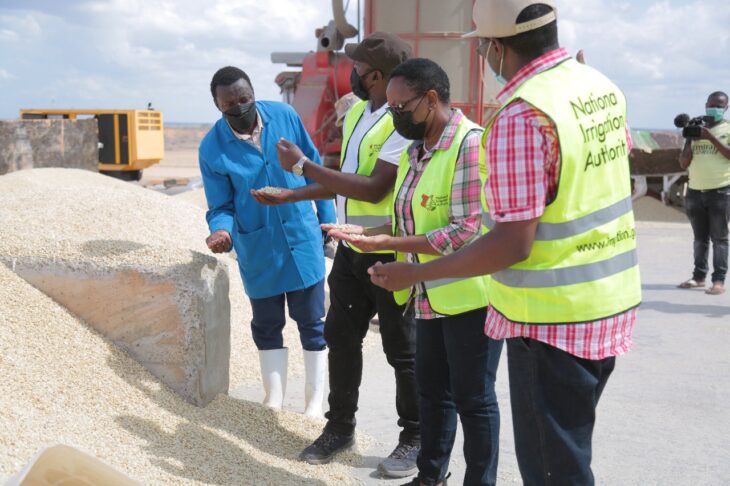TANA RIVER, Kenya, Oct 26 – In 2014, the Jubilee government embarked on one of its most ambitious projects aimed at addressing the country’s perennial food shortage.
The Galana-Kulalu Model farm was touted as the answer to the country’s food security concerns.
The flagship project was initiated in 2014 with an agreement being signed in August between Kenya’s National Irrigation Board (NIB) and Israeli firm Green Arava Ltd – The two partners were to develop a 10,000-acre model farm in the one million-acre irrigation scheme for crop production in Kilifi and Tana River counties.
Years later, critics say little can be shown despite promises and investments worth billions being injected into the project, in a bid to ensure its success.
Approximately 1.3 million people in Kenya are currently facing Crisis (IPC 3) or worse levels of acute food insecurity.
Now, Water and Irrigation Cabinet Secretary Sicily Kariuki says the government has commenced the process of commercializing the 10,000-acre model farm.
The Water Ministry alongside the National Treasury are said to be in the process of identifying a local or international private sector actor to carry on with the work once the National Irrigation Authority (NIA) finalizes the setting up of basic irrigation infrastructure on the model farm.
Basic irrigation infrastructure is being set up on the remaining 4,900 acres of the model farm.
“The process is being managed by the National Treasury right now. Already investor briefings have been done. The project is packaged and is already out in the market under the National Treasury, which is the lead agency in all Public-Private Partnership (PPP) programmes,” said Kariuki.
Kariuki who visited the model farm Monday said that phase two of the project was at a 72 percent level of completion and that it was expected to be ready for commercialization by January 2022.
“The government has decided that given the efficiencies of the private sector in terms of agricultural production, once we have finalized investing in the basic irrigation infrastructure, the 10,000-are model farm is going to be competitively commercialized,” she said.
The bids for the commercialization of the farm are expected to be ‘floated’ international to allow the best actor to carry on with the work with a view to enabling the project to produce optimally in line with the government’s objectives.
“The current process of commercialization of the Galana/Kulalu model farm is one that has been opened up internationally. That means the best bid that we get in terms of the terms that the National Treasury has set out is the one that is going to come in and continue from where we stop,” Kairuki affirmed.
She said that the Galana-Kulalu Food Security Project was one of the government’s initiatives aimed at increasing land under irrigation from the about 540,000 acres in the country to more than 1 million acres as envisaged under the Vision 2030 economic blueprint.
The water ministry is in the final stages of finalizing and disseminating guidelines for farmer-led irrigation programmes at the micro level with a view to giving an enabling environment for more acres of land to be put under irrigation.
The CS also faulted political leaders for accusing the government of ‘abandoning’ the project saying that the dream for the model farm to thrive is still a reality, in line with its big four agenda on food security.
Want to send us a story? Contact Shahidi News Tel: +254115512797 (Mobile & WhatsApp)


